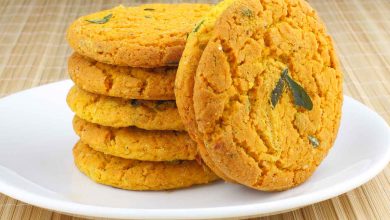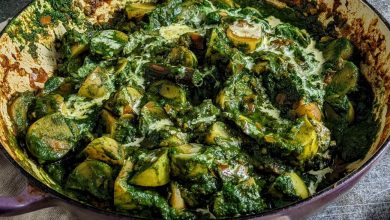High Protein Soya Idli Recipe
Description:
The High Protein Soya Idli is a wholesome and nutritious twist on the traditional South Indian breakfast. This simple-to-make recipe combines the goodness of soya beans, idli rice, and urad dal, which are soaked, ground, and fermented to create soft, fluffy idlis. Rich in protein and packed with flavor, these idlis make for a healthy and satisfying breakfast or snack. The fermentation process ensures a light and airy texture, while the addition of soybeans boosts the protein content, making it a perfect choice for those looking to maintain a high-protein vegetarian diet.
Cuisine: South Indian Recipes
Course: South Indian Breakfast
Diet: High Protein, Vegetarian
Ingredients
| Ingredient Name | Quantity |
|---|---|
| Idli Rice | 2 cups |
| Soybeans (Whole Soya dal) | 1 cup |
| White Urad Dal (Whole) | 1-1/4 cups |
| Methi Seeds (Fenugreek Seeds) | 1 teaspoon |
| Chana Dal (Bengal Gram Dal) | 1 teaspoon |
| Salt | 4 teaspoons |
| Water | As required for grinding and soaking |
Preparation Time: 8 hours
Cooking Time: 20 minutes
Yield: 12-15 idlis (depends on size)
Instructions:
-
Soaking the Ingredients:
Begin by soaking the ingredients. Take the idli rice and immerse it completely in water, ensuring that the rice is well-covered. Let it soak for 6 hours.
Similarly, soak the soybeans in water, ensuring the water level is at least 2 inches above the soybeans to account for their expansion. Let the soybeans soak for 6 hours as well.
In a separate bowl, soak the white urad dal, methi seeds, and chana dal in enough water to cover them. Let them soak for 6 hours. -
Grinding the Ingredients:
After soaking, it’s time to grind the ingredients separately for the idli batter.- First, grind the urad dal into a fine, smooth batter. Add just enough water to achieve a fluffy and smooth consistency. The batter should be light and airy, so take care not to add too much water. Pour this smooth batter into a large container.
- Next, grind the soaked soybeans into a fine paste, again adding just enough water to achieve a fluffy, smooth batter. The texture of the soya batter should be similar to the urad dal batter. Pour this into the same container as the urad dal batter.
- Finally, grind the soaked idli rice into a smooth paste. The rice batter will be slightly coarser than the urad dal and soya bean batters, but ensure it is as smooth as possible without making it too watery. If needed, grind in smaller portions to get the right consistency.
-
Mixing the Batters:
Once all the batters are prepared, combine the urad dal, soya bean, and rice batters together in one large container. Add salt to taste and mix everything thoroughly. -
Fermentation:
Now, cover the batter and let it ferment in a warm place for at least 12 hours or overnight. The fermentation process is crucial for achieving soft, fluffy idlis. You’ll notice that the batter will rise in volume as it ferments, so ensure you are using a large enough container to accommodate this expansion. -
Steaming the Idlis:
Once the batter has fermented, it’s time to steam the idlis. Grease your idli molds with a little oil or ghee. Pour the fermented batter into each mold, filling them about three-quarters full to allow for expansion during steaming.
Steam the idlis for about 15-20 minutes, or until a toothpick inserted into the center comes out clean. The idlis should be soft, fluffy, and perfectly cooked. -
Serving:
Serve the high-protein soya idlis hot with your favorite chutney or sambar for a complete meal. These idlis are not only delicious but also packed with protein, making them an ideal choice for a healthy breakfast or snack.
Nutritional Information (per serving, approximately 2 idlis):
| Nutrient | Amount |
|---|---|
| Calories | 180 kcal |
| Protein | 10g |
| Carbohydrates | 30g |
| Fiber | 4g |
| Fat | 3g |
| Sodium | 400mg |
| Potassium | 250mg |
| Calcium | 50mg |
Tips:
- Ensure the soaking time for each ingredient is followed precisely to achieve the best texture and fermentation.
- The batter should not be too watery, as it may affect the idlis’ fluffiness.
- You can store the leftover idli batter in the refrigerator for a few days or even freeze it for later use.





